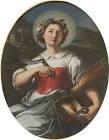
Feast day: 13 September
Born around the year 1265, St Notburga was a cook in the household of Count Henry of Rattenburg. She used to give food to the poor. Her mistress Ottilia ordered her to give any left over food to the pigs. Notburga then began to save some of her own food, especially during the Friday fast, to distribute to the needy. According to her legend, she was stopped by her master and ordered to show what she was carrying: in place of food he saw only wood shavings, and vinegar instead of wine. Ottilia dismissed her, but then fell dangerously ill; Notburga stayed to nurse her and prepare her for death.
Notburga worked subsequently for a peasant in Eben am Achensee, in the Austrian Tyrol. She made a condition, before she entered his service, that she be permitted to go to church the evening before Sundays and festivals. One evening her master demanded that she continue working in the field. Throwing her sickle in the air she said: “Let my sickle be judge between me and you.” The sickle remained suspended in the air.
Duke Henry had meanwhile suffered difficulties, which he ascribed to his dismissal of Notburga, so he rehired her. Shortly before her death in 1313 she told him to place her corpse on a wagon drawn by two oxen and to bury her where the oxen stopped. The oxen drew the wagon to the church at St Rupert near Eden, where she was buried. Pope Pius IX canonised her in 1862.
The church became a pilgrimage site and in 1434 it was dedicated to St Notburga. There is a museum there too - the only museum in Austria dedicated to a saint. Her remains were transferred to a newly-constructed church in Eben and were enclosed in a glass case. Her skeleton is fully dressed; her right arm carries a sickle, her left holds her bread-filled apron and a pitcher dangles from her arm. She is the patron saint of servants and peasants.
St Notburga, pray for us.